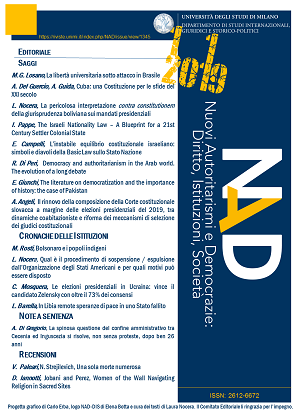Democratization and the relevance of history: the case of Pakistan
DOI:
https://doi.org/10.13130/2612-6672/11792Abstract
Many political scientists have argued, on the basis of extensive quantitative data, that democratic governments result in greater spending in health and education and in a redistribution of resources in favour of vulnerable groups. Democratic governments are also often associated with a decrease in levels of interstate conflict and in internal violence. And yet, there are cases – such as Pakistan – in which this has not occurred. Why have these ‘democracy dividends’ not been realized in Pakistan? This paper addresses some of the reasons why democratic governance in Pakistan has not translated into social welfare and peace, and highlights that the impact of democracy is time and context-specific. Therefore, greater attention must be devoted to the historical and societal peculiarities of each country.
References
M.Akhram, J.K.Faheem, Health Care Services and Government Spending in Pakistan, Pakistan Institute of Development Economics, Islamabad, 2007.
I.A. Elbadawi, P. Keefer, Democracy, Democratic Consolidation and Military Spending, working paper 848, ERF, 2014.
N. Gera, Impact of Structural Adjustment Programmes on Overall Social Welfare in Pakistan, in South Asia Economic Journal, Vol. 8, No. 1, 2007, pp. 39-64.
E. Giunchi, Ethnic Strife and Democratization in Pakistan: Some observations on concepts, measurements and the importance of history, in Quaderni Asiatici, Vol. XXXI, No. 106, 2014:, pp. 21-56
E. Giunchi, Democratic Transition and Social Spending: The case of Pakistan in the 1990s, in Democratization, Vol. 18, No. 6, 2011, pp. 1270-1290.
A.O. Hirschman, The Search for Paradigms as a Hindrance to Understanding, in World politics, Vol. 22, No. 3, 1970, pp. 329-343.
C.B. Mulligan, R. Gil, X. Sala-i-Martin, Do Democracies Have Different Public Policies than Non Democracies?, in Journal of Economic Perspectives, Vol. 18, No. 1, 2004, pp. 51–74.
J.M. Nelson, Elections, Democracy and Social Services, in Studies in Comparative International Development, Vol. 41, No. 4, 2007, pp. 79–97.
M. Ross, Is Democracy Good for the Poor? in American Journal of Political Science, Vol. 50, No. 4, 2006, pp. 860–74.
S. Shafqat, Democracy and Political Transformation in Pakistan, in S. Mumtaz, J-L. Racine, A. Imran (Eds.), Pakistan: The contours of state and society, Oxford University Press, Oxford, 2002, pp. 209–35.










